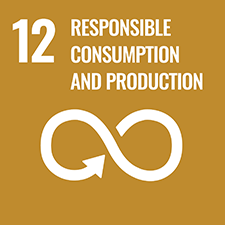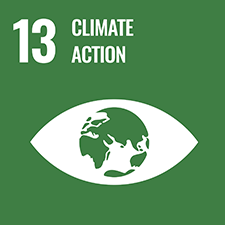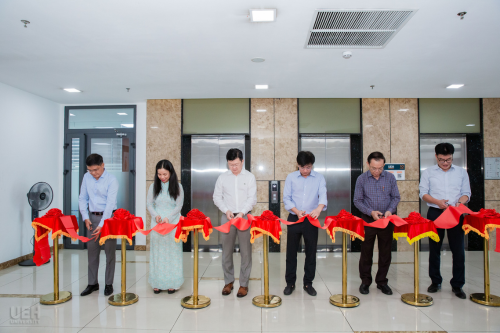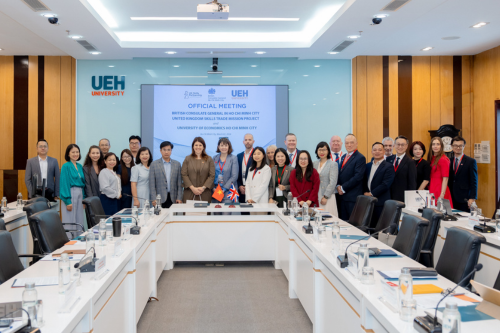UEH's Research Direction in the New Era: From International Publication to Promoting Excellent Applied Research for Sustainable Development
15 May, 2025
Implementing the Party’s and Government’s international integration policy, along with the sustainable development orientation, University of Economics Ho Chi Minh City (UEH) has proactively implemented two parallel strategic research directions: promoting international publications associated with multidisciplinary training and applied research associated with contemporary social, local, and global issues. This is how UEH shapes the role of a multidisciplinary, creative, and responsible university in the new era.
Two strategic approaches and management platforms for UEH to link research with multidisciplinary training and practical application.
In the context of global higher education strongly transforming towards integration and sustainable development, UEH has proactively implemented two parallel strategic research approaches: (1) Research on internationalization strategy through international publication associated with multidisciplinary training and (2) Research on contemporary social, local and global issues in the direction of the 17 SGDs. These two approaches are causally related.
Accordingly, to implement internationalization through international publications associated with multidisciplinary training, UEH has continuously promoted the "quantity and quality" of scholarly publications in prestigious international journals in Scopus and ISI, encouraged lecturers and researchers to cooperate with global scholars and to participate in prestigious international academic networks. Research-training connection is an important foundation for UEH to improve training quality, develop new programs, and new programs associated with global knowledge movements. For example, at UEH, publications only receive funding when associated with its focused teaching areas and research mainstreams determined according to the development orientation of each stage. This ecosystem is the basis for UEH to develop multidisciplinary, opening new training in many fields in recent years, including Arttech, Intelligent control and automation, Marketing technology, Digital business, Technology and innovation, Logistics technology, Architecture and smart urban design, etc.

Two approaches of strategic research and management foundation for UEH to connect research with multidisciplinary training and practical application
In addition, UEH affirms their academic position on the global higher education map with a new approach: research and dissemination of research results related to contemporary issues. Specifically, UEH university implements a policy to encourage publications with topics related to Vietnam's socio-economic development, or to solve problems at the regional or global level according to the 17 SDGs. The research findings in international publications are communicated to the community through the Academic Brand communication program, pioneering the widespread dissemination of research to contribute to Vietnam's socio-economic development. For example, at UEH, each international publication must have a 1-page summary of policy/management implications in a language that can be conveyed to stakeholders and is communicated in multiple forms on UEH's multi-channel communication system in the academic brand communication campaign. This is the way research findings can reach the community and society as fast as possible, initially spreading and inspiring the application of research findings to the community. UEH is also the first university to focus on implementing this program in Vietnam.
With this approach, UEH promotes the application of research findings into policy consulting products, contributing to regional and local development. For example, international and national seminars organized by UEH are associated with local development: National Conference on "Driving force for socio-economic development in the Southeast region: Potential and Challenges", the annual Macroeconomic Report for Ho Chi Minh City, Policy Seminar "Carbon market: Forecasting impacts and policy orientations from Ho Chi Minh City", National Conference on "Contributing to Vietnam's socio-economic development guidelines for the period 2025-2030", national conference series on the implementation of Resolution 57-NQ/TW dated December 22, 2024 of the Politburo on breakthroughs in science, technology, innovation and national digital transformation, etc.
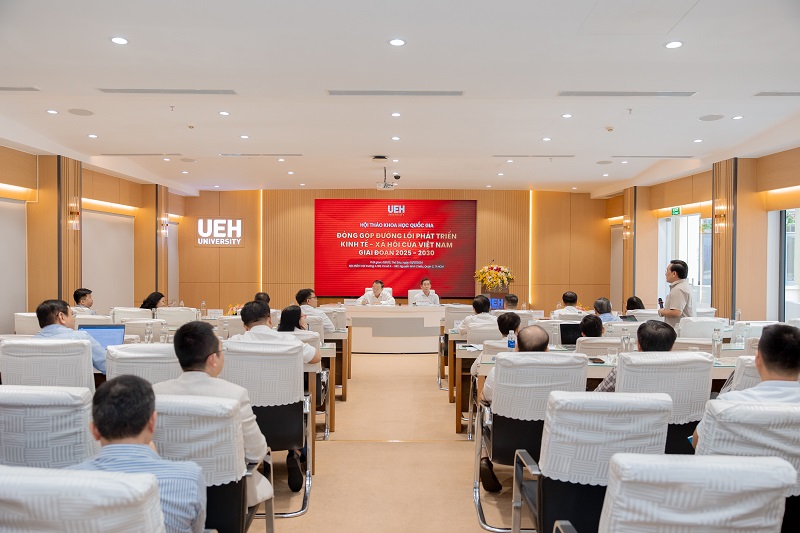
National Conference on "Contribution to Vietnam's socio-economic development strategy for the period 2025-2030" on December 6, 2024
Building an academic environment, research ecosystem, and continuing to fund excellent research on Vietnamese practice and context
In addition to the two new approaches, UEH focuses on building an academic environment and ecosystem to improve research quality and create a launching pad for young researchers. In terms of policy, it does not sponsor/reward Scopus Q4 international research article, aiming at higher journals in the direction of increasing the proportion of Q1, Q2 publications and those in high-impact journals (top 10% according to Citescore), requiring international research papers to collect primary data must be linked to the Vietnamese context, serving the socio-economic development of Vietnam. In terms of human resources, it continues to recruit lecturers with strong research capacity, continuously develops the research capacity of lecturers through the policy of sponsoring lecturers to participate in international conferences and international scholar programs to develop international cooperation networks in research. In terms of academic environment, UEH invests in libraries, builds databases and quality journal search tools, digitizes the management and monitoring system for international publications according to the process of registering for funding proposals, approving, implementing, checking and monitoring implementation results, and making payments; develop research groups, strong research groups according to Decree 109, with the participation of collaborative research experts, graduate students, and trainees to create an ecosystem of research capacity resonance, linking research with training. Regarding finance, UEH supports funding for lecturers to participate in international conferences, to invite international experts to collaborate on research; to maintain funding for excellent research and increase the level of funding/rewards for publications related to SDGs, only fund international research projects with primary data related to the Vietnamese context, to invest in scientific databases, to set maximum levels of rewards/funding to encourage lecturers with good publishing capacity to seek other sources of funding, develop international projects to attract international funding to diversify revenue sources from science and technology.
Positive results for UEH to affirm their international position with internal strength and substance
With a modern and consistent approach to innovation with leading universities, creating an ecosystem that combines internationally oriented research and training, linking research and practice, UEH's policies have demonstrated effectiveness through the results.
Since 2000, UEH has had 3,200 articles published in WOS/Scopus journals (including 255 in the first 4 months of 2025), 720 articles in the top 10% most cited by Scopus (36 in 2025), and Q1/Q2 articles in Scopus reached 84.60%.
In addition, the proportion of international articles related to the 17 Sustainable Development Goals of the United Nations has been increasing, now accounting for more than 50%, with 1,161 articles. In particular, UEH has demonstrated their strengths in traditional fields related to SDG8 (Decent work and economic growth), SDG 9 (Industry, innovation and infrastructure development), and SDG 10 (Reduced inequality), with nearly 600 international publications in the period 2020-2023.
Regarding impact factor, UEH's international publications related to sustainable development goals (SDGs) all have a field-adjusted citation index (FWCI) higher than 1, mostly higher than 2, which means that the citations of international publications in SDGs are 100% higher than the world average.
Especially in SDG3 (Good health and well-being), SDG7 (Affordable and clean energy), and SDG13 (Climate action), UEH achieved a high sector-adjusted citation index (FWCI) of 5.
|
International publications in 2025
|
Until 13/5/2025 |
|
WOS articles
|
140 |
|
Scopus articles |
241 |
|
Total number of WOS/Scopus articles |
255 |
|
Number of articles associated with SDGs according to Scopus |
117 |
|
Number of the most cited articles according to Scopus |
36 |
|
Percentage of Q1/Q2 articles of the total number of articles in Scopus |
87% |
UEH international publication data from the beginning of 2025
|
International publications in 2020 |
Until 13/5/2025 |
|
WOS articles |
2149 |
|
Scopus articles |
2694 |
|
Total number of WOS/Scopus articles |
3200 |
|
Number of articles associated with SDGs according to Scopus |
1161 |
|
Number of the most cited articles according to Scopus |
720 |
|
Percentage of Q1/Q2 articles of the total number of articles in Scopus |
84.60% |
UEH international publication data from 2000 - 2025
Up to the current time, the proportion of UEH lecturers participating in ISI/Scopus international publications has been increasing (accounting for nearly 40% in the 3-year time frame), with an average of 0.8 international articles/lecturer/year. Along with the quantity, the quality of publications has been increasing, with 85% of the articles indexed to Scopus Q1, Q2; 80% published in journals of prestigious international publishers such as Springer, Elsevier, Wiley-Blackwell, Emerald, etc. The Journal of Asian Business and Economic Studies is ranked in Q1 of Scopus, further affirming the encouraging results of academic research and international publications in UEH's internationalization strategy.
In particular, through the Academic Brand communication program "Research Contribution for All" implemented since 2021, UEH has spread more than 200 contemporary research topics in diverse fields from economics, business, law, public policy, technology, and design associated with 17 SDGs, with nearly 1,000,000 outreaches to the community.
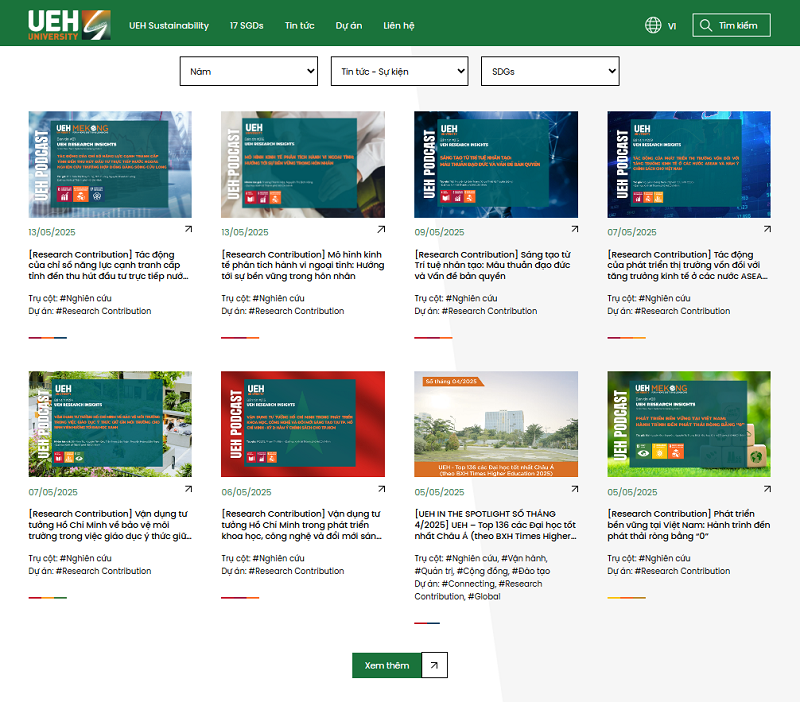
The Academic Brand Communication Program “Research Contribution for All” spreading contemporary research topics in a variety of fields, from economics, business, law, public policy, technology, design, etc., associated with 17 SDGs
The results achieved contribute to bringing UEH into prestigious international university rankings, associated with sustainable development. For example, UEH ranked 136th among the best universities in Asia, in the Top 501+ of the World's leading universities (THE 2025); top 301+ QS Asia Rankings; ranked 860th globally, 234th in Asia and 3rd in Vietnam in the QS World University Sustainability Rankings 2024; ranked 301+ globally on THE Impact 2023; ranked 43rd globally in SDG8 (decent work and economic growth).
“The two strategic approaches and the professional academic ecosystem help UEH combine research with multidisciplinary training and practical application. Choosing the path of development based on internal resources, we have been constantly innovating to solve social challenges and adapt to development practices. We will always adhere to this goal to contribute to the development of Vietnam and knowledge for the world scientific community in accordance with the policies of the Party and the Government, to be worthy of being a key national public university in Vietnam, with a position in the region and the world.” Professor Su Dinh Thanh - President of UEH - remarked./.
News and photos: Department of Communications and Partnerships, Department of Research - Development and Global Engagement





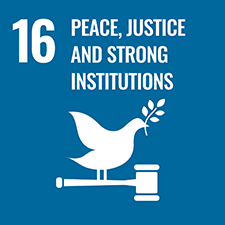
![[Research Contribution] Modernizing and Elevating Vietnamese Higher Education: Creating Breakthroughs in High-Caliber Human Resource Development and Talent Cultivation, Leading Research and Innovation](/images/upload/thumbnail/ueh-thumbnail-639083193174001549.png)

![[Research Contribution] Sustainable Manufacturing: A Driving Force for the Green Economy and the Challenges Ahead](/images/upload/thumbnail/ueh-thumbnail-639082294182922007.png)
